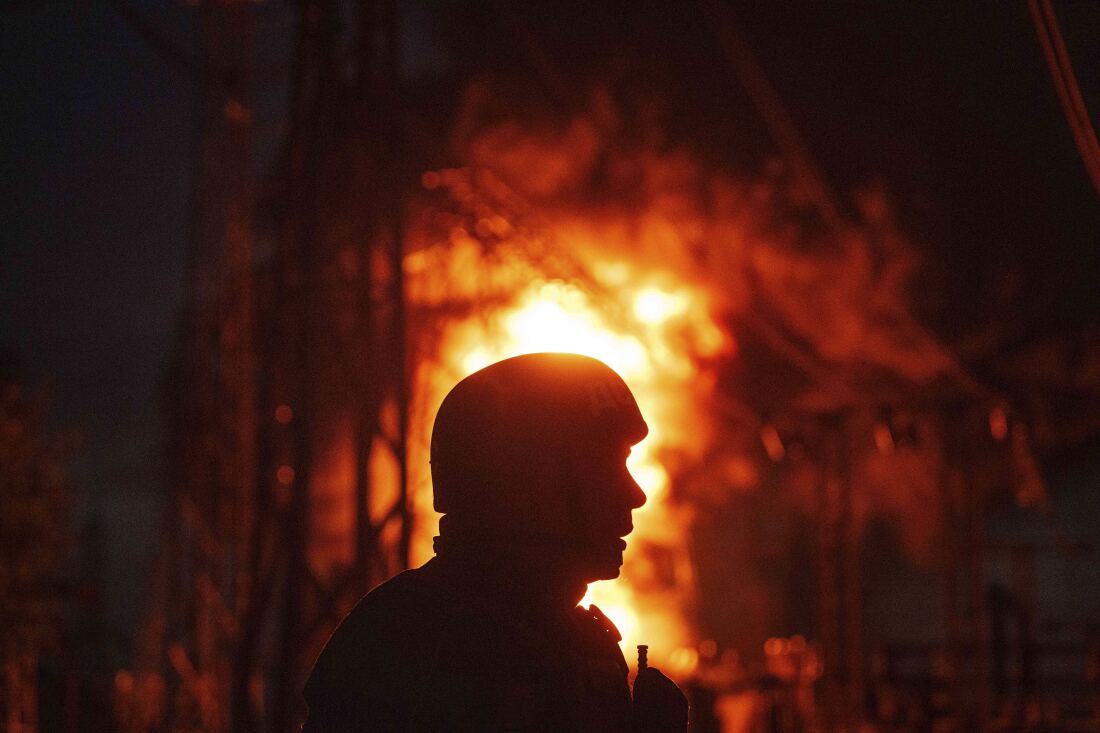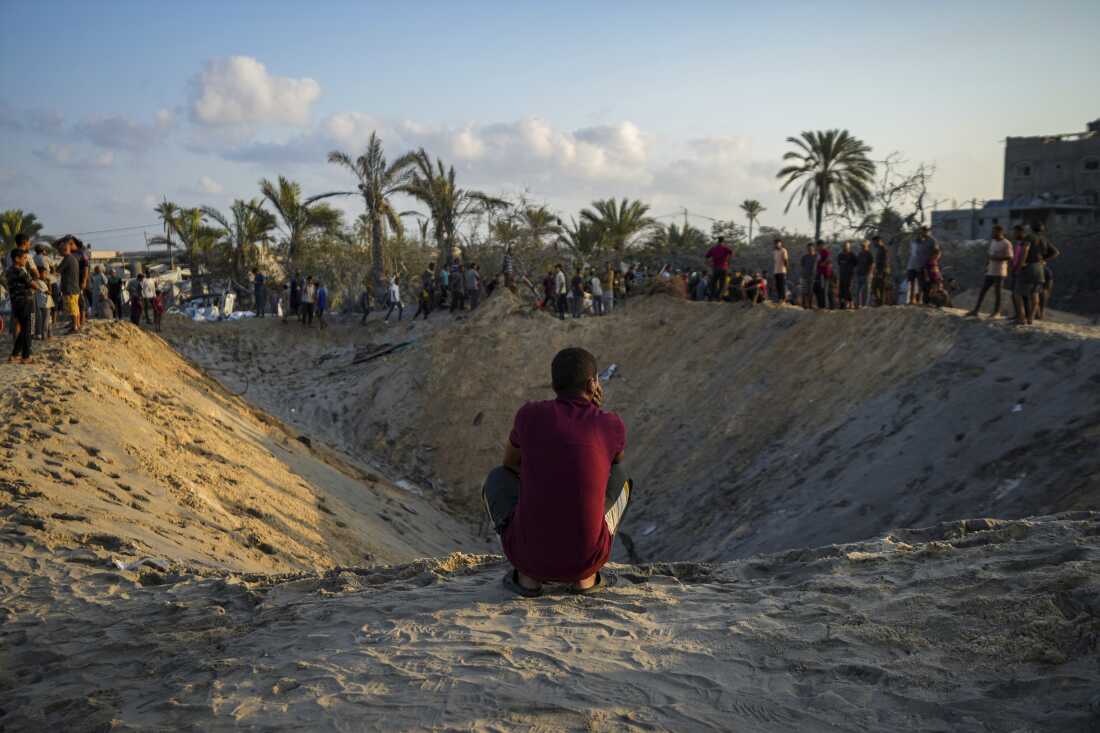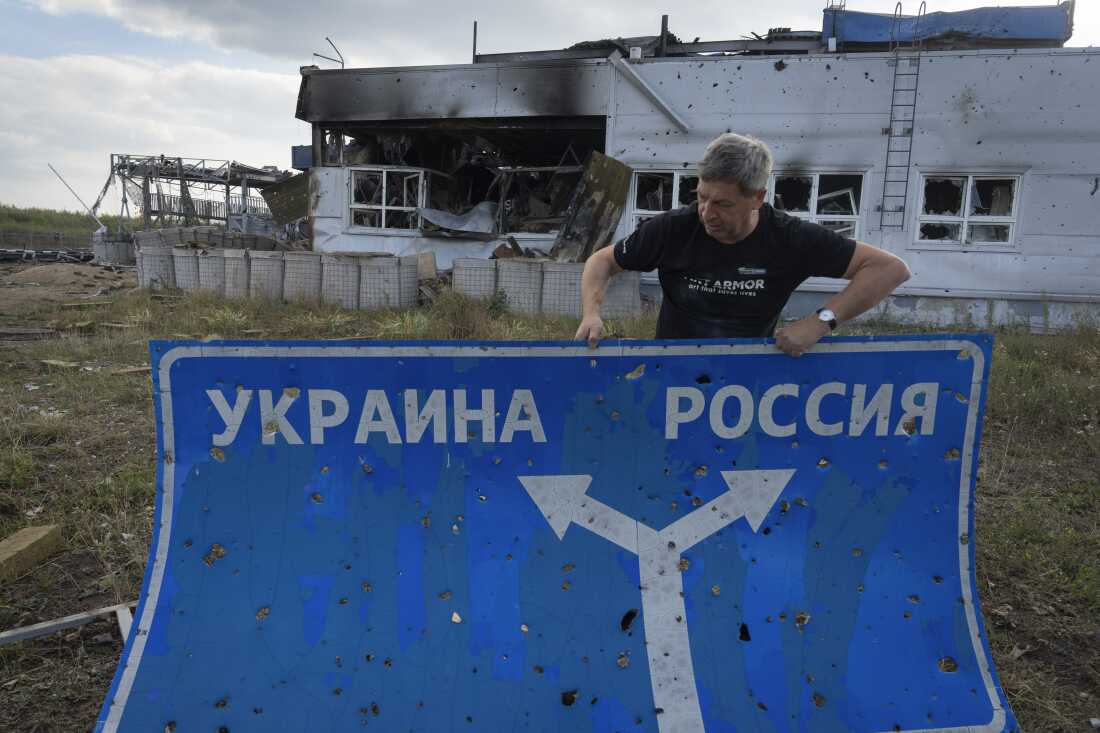
A Ukrainian rescue employee seems to be on at a burning electrical substation hit by a Russian bomb within the Dnipropetrovsk area in jap Ukraine on Sept. 2.
Evgeniy Maloletka/AP
cover caption
toggle caption
Evgeniy Maloletka/AP
Shortly after Russia first invaded Ukraine in 2014, Ukrainian warfare correspondent Andriy Tsaplienko was dwell on TV. The anchor requested him how lengthy the combating would possibly final.
“I said it could take a couple of years to calm down the situation,” Tsaplienko recalled. “When the anchor heard it, he was really terrified on a live broadcast.”
Within the 10 years since then, Tsaplienko has been detained and overwhelmed by Russian troops. He is additionally suffered shrapnel wounds that left him with a limp. He is coated each twist and switch within the combating — and nonetheless doesn’t know when the warfare will finish.
“I don’t want to say forever, but for a long time, maybe another next decade,” he stated in an interview in Ukraine’s capital Kyiv.
The Ukraine-Russia warfare, and the Israel-Hamas battle in Gaza, are each a part of feuds with lengthy histories. Ukraine declared independence from Russia in 1918, then misplaced a warfare within the years that adopted. Ukraine did not achieve independence from Moscow till the 1991 Soviet Union breakup. In the meantime, the Israel-Hamas battle is a part of the bigger Israeli-Palestinian dispute that additionally stretches again a century.
In each present wars, a standard query is, “When will the fighting end?” However given the tortured historical past, it could be higher to ask, “Will it ever end?”

Palestinians take a look at the destruction attributable to an Israeli airstrike on a crowded tent camp housing displaced Palestinians in Muwasi, Gaza Strip, on Sept. 10. The present spherical of Israeli-Hamas combating has been ongoing for practically a yr. The bigger Israeli-Palestinian battle dates again generations.
Abdel Kareem Hana/AP
cover caption
toggle caption
Abdel Kareem Hana/AP
“Both of these conflicts have very, very, high stakes that are relatively indivisible,” stated Gideon Rose, who’s with the Council on Overseas Relations and the writer of How Wars Finish.
“Russia is trying to conquer Ukraine. Ukraine is trying to fight for its life. The Israelis are trying to suppress all attacks from Gaza and the Palestinians are trying to avoid being completely subjugated,” stated Rose, including that this does not depart a number of room for compromise.
These conflicts additionally replicate a harsh actuality of many moderns wars. They will grind on inconclusively — even when the combating reaches the purpose the place neither aspect can rating a whole battlefield victory.
“Sometimes there is no solution for a decade or two,” stated Paul Salem, who’s primarily based in Beirut with the Center East Institute. “You’ve got to manage the problem. You got to contain it. You got to make sure we don’t go into World War III.”

Greater than 100 Russian troops captured by Ukraine are held inside a shelter in Russia’s western area of Kursk, on Aug. 14.
AP/Ukrainian Safety Service Press Workplace through AP
cover caption
toggle caption
AP/Ukrainian Safety Service Press Workplace through AP
Weapons move freely
These present battlefield eventualities aren’t new. Previously, some wars endured for a few years, and even a long time. However a number of elements contribute to creating trendy wars final a very long time, and these two particularly.
First, weapons and know-how have by no means flowed so freely. This implies a smaller navy can get its palms on extra and higher weapons than beforehand. Ukraine makes use of low cost drones to counter Russia’s a lot bigger conventional military.
“Drones are just a toy turned into a weapon,” Andriy Tsaplienko. “One drone can cost maybe up to $1,000, and you can attack a bigger target like a tank, and destroy the tank, which costs $3 million.”
Within the Center East, Israel receives the overwhelming majority of its superior weapons from the U.S. Hamas in Gaza and Hezbollah in Lebanon used to fireside short-range rockets that solely threatened communities simply throughout the border in southern and northern Israel.
However with assist from Iran, these two teams have been firing 1000’s of rockets into Israel, and might now strike all through a lot of the nation.

Israeli Einav Zangauker, whose son Matan Zangauker is being held by Hamas in Gaza, takes half in a protest calling for the return of Israeli hostages outdoors the workplace of Israeli Prime Minister Benjamin Netanyahu in Jerusalem on Aug. 30.
Ohad Zwigenberg/AP
cover caption
toggle caption
Ohad Zwigenberg/AP
Failed efforts at a political answer
A second key think about each conflicts is how they’ve repeatedly defied lasting political options.
“It’s not enough to have a military strategy,” stated Chuck Freilich, a former deputy nationwide safety advisor in Israel. “You have to have a political one as well. And Israel hasn’t had one for years and years, to my thinking, on the Palestinian issue.”
The Israelis and Palestinians had been near a political settlement method again within the yr 2000. Right now, a full-fledged peace deal seems extra distant than ever.
Paul Salem notes that Israel used to struggle conventional state-versus-state wars towards neighboring Arab international locations — like Egypt, Jordan and Syria. Now Israel is making an attempt to take care of long-term management over Palestinians within the West Financial institution and Gaza.
“You can win a war, but it’s hard to win an occupation,” stated Salem. “Beating a state and getting the state to say, ‘OK, I lose,’ or ‘I’m going to stop,’ is different than maintaining an occupation, which the Israelis have not managed to do sustainably.”
In the meantime, Russian chief Vladimir Putin meddled in Ukraine’s politics for years, searching for to position or preserve a Kremlin-friendly chief in energy in Kyiv. When that failed, Russia invaded, initially in 2014, after which once more, on a a lot bigger scale in 2022.

Ukrainian historian Yuri Savchuk, the pinnacle of Ukraine’s World Battle II historical past museum, carries a street signal on Aug. 16 in western Russia’s Kursk area, an space captured by Ukrainian troops. The signal reads ‘Ukraine’ to the left, and ‘Russia’ to the best.
Efrem Lukatsky/AP
cover caption
toggle caption
Efrem Lukatsky/AP
Leaders usually have an incentive to maintain combating
Finally, most wars do finish with negotiations, although the 2 sides are inclined to make a deal solely after one or each have reached the purpose of exhaustion.
“We assume war is so terrible, therefore it must be the incentive of people to stop it,” stated Gideon Rose. “That’s not necessarily the case.”
He notes that leaders waging the wars usually make very totally different calculations than troopers and civilians bearing the brunt of the battle.
“Somebody who initiates a war usually has a strong incentive to keep fighting, because unless he can get a real victory when it ends, he’s kind of in trouble,” stated Rose.
Leaders who lose wars are usually tossed out of energy, and the potential penalties will be much more critical.
The Worldwide Felony Courtroom in The Hague has issued an arrest warrant for Russia’s Vladimir Putin, and prosecutors are searching for warrants for Israel’s Benjamin Netanyahu and Hamas chief Yahya Sinwar.
And in instances of warfare, leaders usually pursue objectives that could be past their attain. Israel’s Netanyahu requires “total victory” over Hamas. He needs to finish the group’s rule over Gaza, and its menace to Israel, as soon as and for all.
But Chuck Freilich stated Hamas and its allies, Iran and Hezbollah, see mere survival as a victory, and are pursuing their very own long-term plans.
“This is a multi-decade war in which there will be round-after-round. And they [Hamas, Hezbollah and Iran] are fully cognizant of that,” he stated.
Freilich additionally added this sobering be aware.
“I would say that Iran is an enemy which is too big, too far away, too powerful and maybe too sophisticated in its thinking for Israel to be able to defeat it,” he stated. “Now, I believe Israel can defend itself against Iran, but I’m not sure that we can defeat it as we did to the Arab countries.”

Displaced Palestinians take shelter at a college in Khan Younis, within the southern Gaza Strip on Sept. 4.
Abdel Kareem Hana/AP
cover caption
toggle caption
Abdel Kareem Hana/AP
Within the Russia-Ukraine warfare, Putin describes Ukraine as not being an actual nation, a spot that needs to be a part of Russia.
Andriy Tsaplienko, the Ukrainian warfare correspondent, says that is precisely why Ukraine retains combating.
“We realize this war is crucially important for Ukrainians,” he stated. “This is the existential war. We will live or we won’t live. That’s it. I mean, as a nation in general. So that’s why we will fight to the end.”
A struggle that also has no finish in sight.



